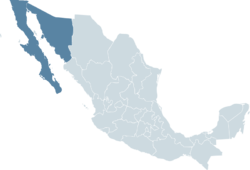Republic of Sonora
| Republic of Sonora | ||||||||||||||
| República de Sonora | ||||||||||||||
| Unrecognized state | ||||||||||||||
| ||||||||||||||
|
| ||||||||||||||
 | ||||||||||||||
| Capital | La Paz, Baja California | |||||||||||||
| Government | Republic | |||||||||||||
| President | William Walker | |||||||||||||
| History | ||||||||||||||
| • | Independence | January 10, 1854 | ||||||||||||
| • | Disestablished | May 8, 1854 | ||||||||||||
| Area | ||||||||||||||
| • | 1854 | 323,091 km² (124,746 sq mi) | ||||||||||||
| ||||||||||||||
| Today part of | | |||||||||||||
The Republic of Sonora was a short-lived declared federal republic composed of two states: the controlled Baja California (present day Baja California and Baja California Sur) and non-controlled Sonora.
History
In the summer of 1853, an American adventurer and soldier by the name of William Walker traveled to Guaymas, seeking a grant from the government of Mexico to create a colony that would serve as a fortified frontier, protecting US soil from retaliations by Native Americans. Mexico refused, and Walker returned to San Francisco determined to obtain his colony, regardless of Mexico's position. He began recruiting from amongst American supporters of slavery and the Manifest Destiny Doctrine, mostly inhabitants of Kentucky and Tennessee. His intentions then changed from forming a buffer colony to establishing an independent Republic of Sonora, which might eventually take its place as a part of the American Union (as had been the case previously with the Republic of Texas). He funded his project by "selling scripts which were redeemable in lands of Sonora."
On October 15, 1853, Walker set out with 45 men to invade and conquer the Mexican territories of Baja California and Sonora. He succeeded in capturing La Paz, the capital of sparsely populated Baja California, which he declared the capital of a new Republic of Baja California, with himself as president and his partner, Watkins, as vice president; he then put the region under the laws of the American state of Louisiana, which made slavery legal. The declaration of independence from Mexico was written on January 10, 1854. Fearful of attacks by Mexico, Walker moved his position twice over the next three months, first to Cabo San Lucas, and then further north to Ensenada to maintain a more secure position of operations. Although he never gained control of Sonora, less than three months later, he pronounced Baja California part of the larger Republic of Sonora.[1]
Walker's exploits generated large amounts of interest back in San Francisco, where bonds for the Republic of Sonora were sold and its flag was even raised in places. However, Walker was never able to take advantage of his project's popularity. A serious lack of supplies, discontent within his party and an unexpectedly strong resistance by the Mexican government quickly forced Walker to retreat.[2]
Back in California, Walker was put on trial for conducting an illegal war. The judge indicated that Walker was guilty of violating the peace treaty agreed upon by the United States and Mexico after the Mexican–American War (1846–48). However, it was the era of Manifest Destiny and consequently his filibustering project was popular in the southern and western United States. Because of this, the jury took only eight minutes to acquit him.[3]
See also
- Crabb Massacre
- Historical outline of Arizona
- Sonora
- Gadsden Purchase
- Arizona Territory (Confederate States of America)
- Traditional Arizona
- Golden Circle (slavery)
References
- ↑ Filibustering: William Walker. CRWFlags.com. Accessed March 11, 2012.
- ↑ William Walker. Tennessee History for Kids. Accessed March 11, 2012.
- ↑ The Biography of William Walker. About.com. Accessed March 11, 2012.
